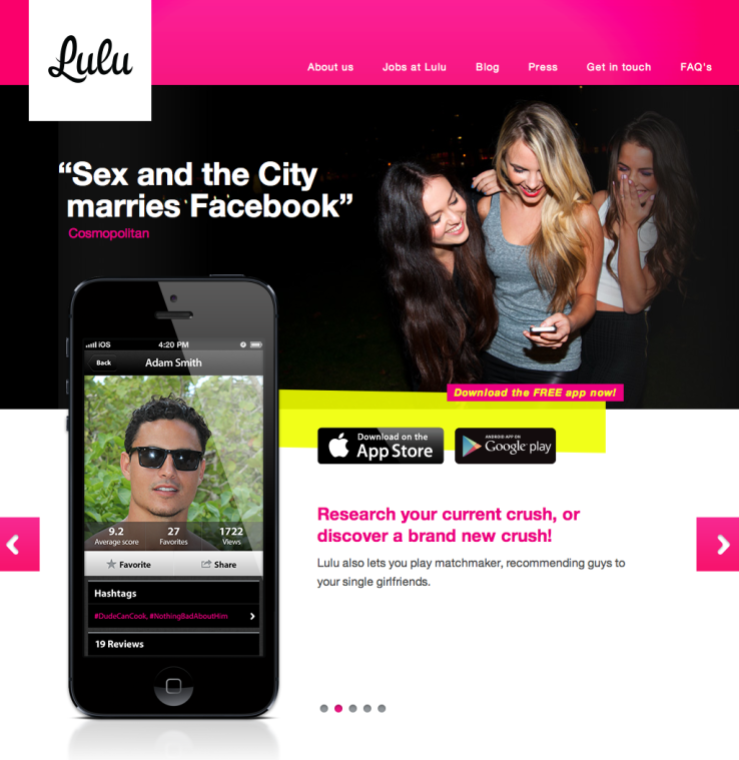More than half a century ago, George Orwell’s novel “1984” described an authoritarian future where our every move is vigilantly monitored by an unseen eye. Well, not only is that future already here, but it just might think you’re, like, really #hot.
Lulu, the iPhone and Android app that allows women to anonymously review men and rate them using an online quiz, has been sweeping college campuses — and in my opinion, it is a pants-shittingly terrifying sign of our times.
The app, rebooted and released in February 2013, has some dubious features: after demanding access to your Facebook and phone contacts, Lulu tracks down men in your area, allows you to add them to your favorites and then updates you on any of their activities.
Combined with the social and geographic trails we already leave on other social media sites, Lulu begins to close the gap between the worlds of “networking” and tracking the migratory patterns of humpback whales.
Except in the whale’s case, nobody is judging its blubber or relationship with its mother — which is completely normal for a whale his age.
Anyway, I’m not too worried about Lulu damaging my “cred.”
Besides lacking said cred, I figure I can generally steamroll over my social awkwardness for at least one encounter — or if I’m at a bar, I can just plaster over it with the patented ol’ “Aaron Friedman charm” (hint: it’s alcohol).
My major gripe is that I can’t comprehend Lulu, and it muddles my understanding of the already confusing fairer sex.
Here’s where some of my confusion begins:
Lulu explicitly says in its frequently asked questions section that it’s “definitely not evil” and that vindictive reviewers can’t carelessly — or carefully — defame the men they hate.
However, photography junior Allison Ballard, who downloaded the app to laugh at its ridiculousness, says some inaccurate reviews of men she knows has got her saying, “No he’s not [like that] — not at all.”
In fact, the vengeful nature of some users is featured on the blog of Lulu’s website.
HerCampus BC — who claims she is not a “serial psycho-reviewer” — posted the following: “To all you guys who never gave me the time of day, watch out … If you were ever a jerk to me, my roommates, my sister or someone I was ever friends with, I will probably leave a harsh review of you.”
Really? Can we be sure that a reviewer like this would spare anyone? I mean, Christ, she claims that Lulu gives her “the power to be Taylor Swift.”
That’s too much power.
But do women even heed the Taylor Swiftian warnings from their peers?
Sophomores Brooke Menzato and Amanda Morice, who both downloaded then deleted the app after several days, agree they would never trust Lulu’s advice to be unbiased.
Also on Lulu’s blog, RecruitmentChairTSM tells another story of a girl who ignores Lulu’s advice. In it, a nameless sorority sister falls in love with, then cyberstalks, “Aaron (insert Greek letters here)” after meeting him at a mixer.
When it’s revealed on Lulu that Aaron is actually a big-footed seventh-year senior with commitment issues and an unfavorable rating, she does the deed with Bigfeet anyway and catches a ride home the next day with her pledge-servant.
The story concludes with, “Girls will be girls,” to which I say: What are you, crazy?
I mean, I’m all for women’s lib — sexual and otherwise — and I hate that “crazy” is used to dismiss girls like emotionally distressed flies, whether they like you too much, don’t like you at all or simply cried during the season finale of “The Bachelorette.”
But this is different, right?
If the point of the app really were to point women toward good relationships, why would someone so blatantly ignore it?
And why wouldn’t Lulu include the hashtags that might actually matter had Aaron (not me, the other one) been harboring darker secrets than size-17 feet? For example, I’m sure #AbusiveDrunk or #HeTriedToRapeMe would be helpful advice to someone if they applied.
The simple answer might be because that would take away from the Lisa Frank girly fun of an app that’s as good at forming healthy relationships as a game of MASH.
If that’s the case, then I don’t want to ruin the fun; I just want to understand it.
Is Lulu meant to be a joke, despite creator Alexandra Chong’s assertion that it is indeed a serious tool for women?
Or does Lulu genuinely not realize how it’s emulating the system of objectification and judgment that most girls claim to hate? Yes, I acknowledge that men have been rating and reviewing women online for years, and some sites are far worse than Lulu.
Jennifer Grossman warns women on Lulu’s blog to never “initiate any contact with a man,” and “never, ever let the crazy out there,” but I’m begging you: ignore that advice.
Instead, break out the crazy. Initiate contact. Let me know what Lulu is really all about, because I honestly still do not get it.
Aaron Friedman is a 22-year-old Spanish senior from Destrehan, La.





